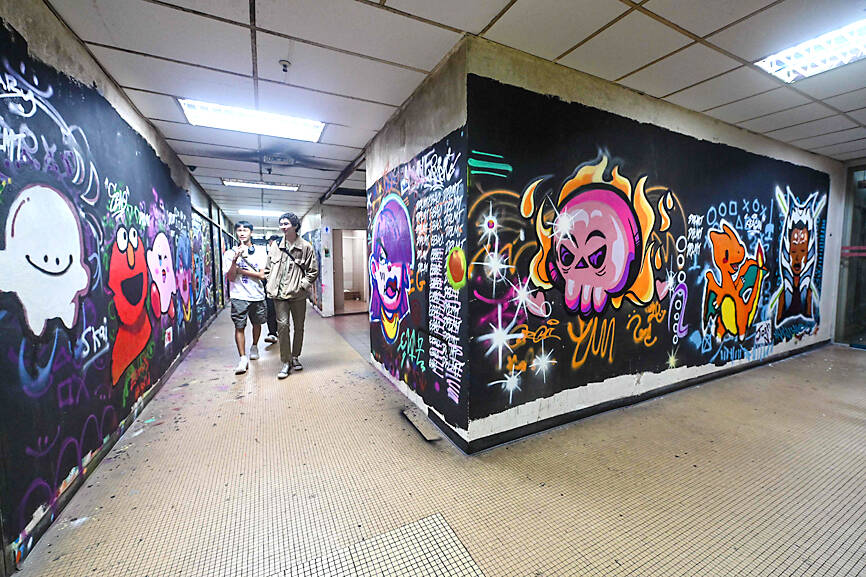In Singapore, where graffiti is banned, young creatives have taken over an abandoned mall, spray painting colorful murals and holding art workshops to bring the space back to life.
About half a century old, Peace Centre is scheduled to face the wrecking ball later this year, but fans say it has provided a rare space for self-expression.
Permission from authorities is required for any kind of street art in the Southeast Asian country.

Photo: AFP
In August last year, PlayPan, an initiative cofounded by entrepreneur Gary Hong (洪逸凡), convinced developers to postpone the mall’s demolition.
The answer the initiative’s backers received was that they could go ahead and use the space for “a social experiment to bring [the] community together,” Hong said.
They were given the space to host performances and workshops for several months, allowing artists, students, charities and small businesses to set up shop for free or at heavily discounted rates.
The eclectic mix of pop-up stores, art tours and musical performances has transformed the once lackluster mall into an unexpected art haven. However, at the end of this month, the mall is to close definitively, bringing an end to the art project.
Peace Centre was once a popular mall, but lost its shine to glitzier shopping centers that mushroomed over the past few years.
In the past two decades it was mostly known for its printing shops and seedy karaoke lounges.
Since its revamp into an art space, young people have attended graffiti workshops, coloring shuttered shopfronts with spray cans while punters browsed through second-hand clothing stalls and exhibits.
“It’s not something you do on a normal weekend, less so inside an indoor area, in a mall,” said Darryl Poh, a 29-year-old sales trader who took part in a spray-painting workshop.
The bathroom walls and mirrors were splattered with graffiti, while a Rage Against the Machine song blared from one of the pop-up stores. Craft cocktails were served on the ground floor and nearby, death metal CDs and trinkets were on sale.
Such spaces are uncommon in Singapore.
“I think you just got to know where to look. The government can curate things, but people are still going to do their own thing,” said Ning Fei, 34, who was selling typewritten poems.
The outer walls were plastered with flyers advertising activities from ukulele classes to pebble painting, while a futuristic mural welcomed visitors arriving at the main entrance.
Gabriel, a 43-year-old photographer who asked to be identified only by his first name, set up a booth to take portraits of passersby for charity.
“The energy here was really exciting. There were a lot of things you don’t typically see in Singapore malls,” he said, describing the vibe as “very non-Singaporean, very organic.”
“I’m going to miss this community very much. I’m glad to have plugged in and participated in this swan song,” he said.

Kehinde Sanni spends his days smoothing out dents and repainting scratched bumpers in a modest autobody shop in Lagos. He has never left Nigeria, yet he speaks glowingly of Burkina Faso military leader Ibrahim Traore. “Nigeria needs someone like Ibrahim Traore of Burkina Faso. He is doing well for his country,” Sanni said. His admiration is shaped by a steady stream of viral videos, memes and social media posts — many misleading or outright false — portraying Traore as a fearless reformer who defied Western powers and reclaimed his country’s dignity. The Burkinabe strongman swept into power following a coup in September 2022

‘FRAGMENTING’: British politics have for a long time been dominated by the Labor Party and the Tories, but polls suggest that Reform now poses a significant challenge Hard-right upstarts Reform UK snatched a parliamentary seat from British Prime Minister Keir Starmer’s Labor Party yesterday in local elections that dealt a blow to the UK’s two establishment parties. Reform, led by anti-immigrant firebrand Nigel Farage, won the by-election in Runcorn and Helsby in northwest England by just six votes, as it picked up gains in other localities, including one mayoralty. The group’s strong showing continues momentum it built up at last year’s general election and appears to confirm a trend that the UK is entering an era of multi-party politics. “For the movement, for the party it’s a very, very big

ENTERTAINMENT: Rio officials have a history of organizing massive concerts on Copacabana Beach, with Madonna’s show drawing about 1.6 million fans last year Lady Gaga on Saturday night gave a free concert in front of 2 million fans who poured onto Copacabana Beach in Rio de Janeiro for the biggest show of her career. “Tonight, we’re making history... Thank you for making history with me,” Lady Gaga told a screaming crowd. The Mother Monster, as she is known, started the show at about 10:10pm local time with her 2011 song Bloody Mary. Cries of joy rose from the tightly packed fans who sang and danced shoulder-to-shoulder on the vast stretch of sand. Concert organizers said 2.1 million people attended the show. Lady Gaga

SUPPORT: The Australian prime minister promised to back Kyiv against Russia’s invasion, saying: ‘That’s my government’s position. It was yesterday. It still is’ Left-leaning Australian Prime Minister Anthony Albanese yesterday basked in his landslide election win, promising a “disciplined, orderly” government to confront cost-of-living pain and tariff turmoil. People clapped as the 62-year-old and his fiancee, Jodie Haydon, who visited his old inner Sydney haunt, Cafe Italia, surrounded by a crowd of jostling photographers and journalists. Albanese’s Labor Party is on course to win at least 83 seats in the 150-member parliament, partial results showed. Opposition leader Peter Dutton’s conservative Liberal-National coalition had just 38 seats, and other parties 12. Another 17 seats were still in doubt. “We will be a disciplined, orderly